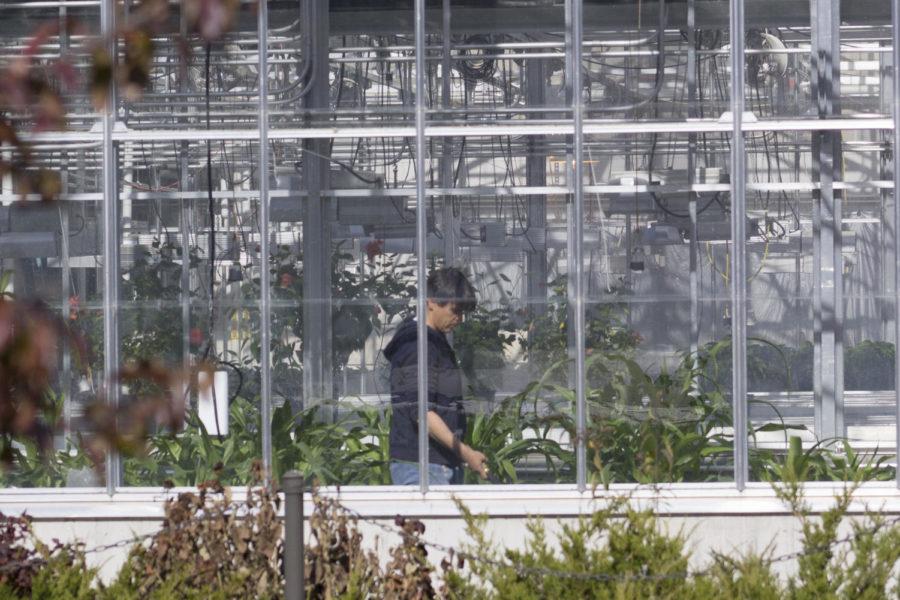Mutation discovery advances plant fertility research
Kennedy DeRaedt/Iowa State Daily
Scientist I, Ursula Frei waters corn plants Oct. 29 in the greenhouses near Horticulture Hall. Frei is a faculty member of the Agronomy department. The greenhouses support activities related to certain courses, research and departmental use.
An Iowa State professor’s research led to the discovery of a plant mutation that has been found to restore male fertility in haploid plants, allowing for the accelerated development of pure genetic lines, and could impact how fast plant breeding can occur.
The research, published in Nature Plants, allows male fertilization without seed exposure to the chemical colchicine, a toxic chemical that returns fertility to male plants but is labor- and cost-intensive according to the College of Agriculture and Life Sciences website.
Thomas Lübberstedt, professor in agronomy and contributing researcher, said this research is a way to overcome the need for the chemical treatment.
“First of all, because it’s toxic and also because it’s laborious to apply that chemical [to plants],” Lübberstedt said.
Lübberstedt said multiple genotypes in maize have been screened and then haploid versions were created. He said they looked for genotypes with the tendency to become fertile.
“The male fertility is the main bottleneck, so we have been looking for plants that are happy to haploid, only one genome, but still are able to produce pollen,” Lübberstedt said.
Siddique I. Aboobucker, a research scientist in the agronomy department, said the double haploid technology is a process that can speed up the process of obtaining genetically pure lines in the time span of two plant generations.
Aboobucker said there are two steps within this technological breeding process: haploid induction and subsequent doubled haploid production from fertile haploid plants.
Aboobucker said in the first step, the haploid plant will only carry one set of chromosomes, versus regular maize, which has two sets. He said the haploid plants then need to be treated with chemicals, and the haploid seedlings are exposed to toxic chemicals, such as colchicine, to restore male fertility [which] is both labor and cost intensive.
“This research was funded by the Foundation for Food & Agriculture Research, and [with] this grant the goal was to screen mutants in Arabidopsis, so we established a pipeline to screen for potential candidate genes,” Aboobucker said.
Aboobucker said the double haploid technology is an active area of research because it can speed up the process of obtaining genetically pure lines.
“These lines serve as parents for hybrid breeding like the corn hybrids that we see in Iowa and in our neighboring states,” Aboobucker said.
The study focused on a mutation in the parallel spindle genes, effectively restoring male fertility in haploid Arabidopsis thaliana plants.
According to Carolyn Lawrence-Dill, the associate dean for research and discovery for the College of Agriculture and Life Sciences, Arabidopsis is a model plant with a smaller genome and fewer genes, which allows researchers to understand the function of each gene in the model plant.
“Arabidopsis has a much smaller genome, and so there are certain things that we can figure out in Arabidopsis since we know what nearly all the genes in that genome do,” Lawrence-Dill said.
Lawrence-Dill said Lübberstedt’s lab is a leading group on topics using haploid maize for breeding.
“Haploid technology allows us to get parental lines with the genes that we want much more quickly and [in] fewer generations, and so this is really about being able to speed the process of breeding,” Lawrence-Dill said.
Lawrence-Dill said the research would allow for breeding that generates plants that have superior traits more quickly.
“This finding is something that is foundational to breeding lines in fewer generations, so if you think about this knowledge and technology as being something that impacts how fast we can do all kinds of breeding in plants, it’s huge,” Lawrence-Dill said.
Lawrence-Dill said one of the major challenges for haploid breeding was low pollen viability, and this finding addresses that drawback.
“The whole concept here is that if [the researchers] could figure it out in Arabidopsis, this model with a tiny genome[…], then it will probably also apply to maize,” Lawrence-Dill said.
Your donation will support the student journalists of the Iowa State Daily. Your contribution will allow us to purchase equipment, send our student journalists to conferences and off-set their cost of living so they can continue to do best-in-the-nation work at the Iowa State Daily.













